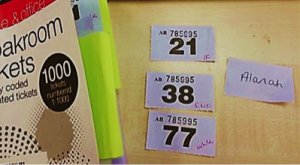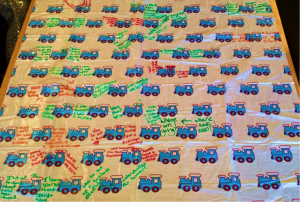When something is new, or we are teaching outside of our comfort zone it is only natural to keep our lessons ‘safe’ and potentially a bit dull for our students. As teachers are developing their practice in computing education here in the UK, potentially, they could focus on their own subject knowledge and resources rather than creativity in the classroom. Here at Manchester Metropolitan University I wanted to challenge the trainee computing teachers, and their subject mentors in school, to add a sense of innovation and fun to their classrooms. One way to do this was to join in with the #poundlandpedagogy challenge.
The Poundland Pedagogy challenge requires teachers to have a shop and find something that they could use to provide a fresh idea in their classroom. The initiative was originally developed in the UK by Isobella Wallace and you can see lots of ideas on Twitter using #poundlandpedagogy or #poundstorepedagogy. The students here were presented with a range of poundshop items and had to take a ‘lucky dip’ to see what they got. They then had to take their item into school and use it in some way in their computing teaching. They were so creative and have managed to use just about everything from blindfolds to plastic cups. There’s just a giant furry moustache that has us stumped at the moment.
Ideas we have used include clothes pegs and a washing line to place instructions in our algorithm in order, an egg timer to compare the length of time our different sorting algorithms take and string to make different network topologies. We have also used lolly sticks to write pupil names on to choose groups and used a kitchen timer when the interactive whiteboard was otherwise engaged.
In the example below the students are learning about signed integers in binary using sign and magnitude. The student in the pound shop shower cap represents the sign. The pupils loved it and strangely, all wanted a turn to wear the shower cap! You can imagine them all now remembering that for their exams.
In this lesson pupils are programming for a prize. The more complex their code the more chances they have of winning at the end of the lesson in the prize draw. For each feature their code has (in this case IF, ELIF and WHILE) a raffle ticket with their name on it is added to the draw. Pupils are really keen to develop their code to win the prize (today, part of a poundland pen set). The raffle tickets cost (you’ve guessed it!) a pound and last for lots of lessons.
‘Splat mats’, designed to go under toddler high chairs to catch all the mess when they are eating, work wonders in a classroom – no, not for the mess – for writing on with dry wipe markers and using again and again. In this example, the pupils are designing apps for a business. They use the green pens at the start of the lesson to identify what they need to learn during their lesson (journey) and then red pens at the end to identify how far they have come and summarise their progress. A great way of getting reluctant writers to do some planning and evaluating.
These suggestions are by no means exhaustive and I’m sure you will have many more creative ideas of your own. Go and have a browse in your local pound shop (or Euro / Dollar equivalent) and let you imagination run wild. Once you try something, tweet your idea with the hashtag #poundlandpedagogy or #poundstorepedagogy and include us @ICTinPractice too so we can see all the great ideas out there. In the meantime if anyone has an idea what to do with a giant furry moustache that fits on bicycle handlebars – let us know!
This article is written with massive thanks to the Manchester Metropolitan University Computing PGCE students, their pupils and mentors.

















